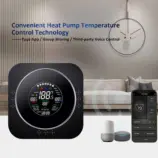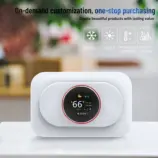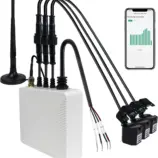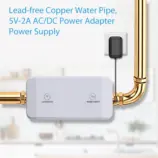In an era where technology seamlessly intertwines with daily life, ensuring the security of our homes has transcended traditional means, welcoming the era of smart home security. This blog explores how cutting-edge smart technology not only enhances the physical security of our living spaces but also integrates with our lifestyle, offering convenience, control, and peace of mind. From the foundational smart locks and surveillance cameras to advanced environmental monitoring and predictive AI, we delve into the innovations transforming home safety. Join us as we uncover the layers of smart home security, offering insights, tips, and a peek into the future of making our homes the safest place to be.
The Evolution of Home Security and the Emergence of Smart Technology
In today's digital age, the concept of home security has transcended traditional alarms and locks, embracing the innovative realm of smart technology. This transition not only marks a significant evolution in how we protect our homes but also offers unprecedented convenience, control, and peace of mind. This segment explores the transformation of home security systems and the pivotal role smart technology plays in modernizing home protection.
The Traditional Landscape of Home Security
Historically, home security systems relied on basic mechanisms such as mechanical locks, physical barriers, and alarm systems that required manual activation or deactivation. These systems, while effective to a degree, offered limited flexibility and often failed to provide real-time updates on security breaches, leaving homeowners in a constant state of uncertainty about their property's safety.
The Revolution Brought by Smart Technology
The advent of smart technology has revolutionized home security, introducing a new era of connected systems that offer both enhanced protection and user convenience. Key components of smart home security include:
- Smart Locks: Offering keyless entry and remote access, smart locks allow homeowners to control access to their homes via smartphones, enhancing security and eliminating the risks associated with lost or stolen keys.
- Smart Cameras: Wi-Fi-enabled cameras provide real-time surveillance, motion detection, and the ability to stream live footage directly to a smartphone or tablet, ensuring homeowners can monitor their property from anywhere in the world.
- Smart Alarms: These systems not only alert homeowners to intrusions but also provide detailed information about the nature and location of the breach, facilitating a swift response.
- Smart Sensors: From door and window sensors to motion and glass break detectors, these devices offer comprehensive monitoring, instantly notifying homeowners of potential security threats.
Benefits of Integrating Smart Technology into Home Security
The integration of smart technology into home security systems offers numerous benefits, including:
- Enhanced Protection: Real-time alerts and remote monitoring capabilities ensure that homeowners are always aware of their home's security status.
- Convenience: The ability to control and monitor security systems remotely provides unmatched convenience, allowing homeowners to secure their property even when away.
- Customization: Smart security systems can be tailored to meet the specific needs and preferences of homeowners, offering a personalized security solution.
- Preventive Measures: Many smart security systems are designed not only to alert homeowners after security breaches have occurred but also to prevent them through deterrents such as automated lighting and sound alarms.
The evolution of home security, propelled by the integration of smart technology, has fundamentally transformed how we protect our homes. This shift not only enhances the efficacy of security measures but also brings unparalleled convenience and control to homeowners. As we continue to explore the capabilities of smart technology in improving home security, it's clear that the future of home protection is digital.
Practical Applications of Smart Home Security Technologies
Delving deeper into the realm of smart home security, this segment explores the practical applications of these technologies in everyday life. By integrating smart security devices and systems, homeowners can significantly enhance the safety and security of their homes. Here, we highlight some of the most impactful smart security technologies and how they can be utilized effectively.
Smart Locks and Access Control
Smart locks revolutionize home entry by offering keyless access, temporary guest access, and the ability to lock or unlock doors remotely. Practical uses include:
- Remote Access: Granting or revoking entry to your home remotely, ideal for letting in guests or service providers without providing a physical key.
- History Logs: Monitoring who enters and exits your home and when, providing an audit trail that can be invaluable in the event of a security incident.
Surveillance Cameras and Video Doorbells
With advancements in camera technology, homeowners can now monitor their property in high definition, day or night, and even detect motion or specific activities.
- Live Monitoring: Watching live feeds from your cameras to keep an eye on your home, children, or pets from anywhere.
- Motion-triggered Alerts: Receiving instant notifications when unexpected motion is detected, allowing for quick assessment and response.
Intelligent Alarm Systems
Modern alarm systems go beyond loud noises; they integrate with other smart home devices for a comprehensive security approach.
- Automated Responses: Setting up your system to turn on lights or play sounds when an alarm is triggered to deter intruders.
- Professional Monitoring: Opting for a service that ensures authorities are notified in the event of a break-in, even if you're unable to respond to an alert.
Environmental Monitoring
Smart technology isn't limited to preventing intrusions; it also protects against environmental threats like fires, floods, and carbon monoxide leaks.
- Smoke and CO Detectors: Getting alerts on your phone if dangerous levels of smoke or CO are detected, whether you're home or away.
- Water Leak Sensors: Placing sensors near water-prone areas to detect leaks early, preventing costly water damage.
Integrating Smart Home Security with Automation Platforms
One of the most significant advantages of smart home security technologies is their ability to integrate with broader home automation systems. This integration allows for:
- Scenes and Routines: Setting up automated actions, such as locking all doors and turning off lights when your security system is armed at night.
- Voice Control: Using voice assistants like Amazon Alexa or Google Assistant to control your security devices with voice commands.
The practical applications of smart home security technologies offer homeowners not just enhanced security but also greater convenience and control over their home environment. By understanding how to effectively utilize these technologies, individuals can create a safer and more secure living space. As we look ahead, the final part of this blog will explore tips for implementing these technologies and the future of smart home security.
Implementing Smart Home Security Solutions and Looking Ahead
As we have explored the transformative impact and practical applications of smart home security technologies, it's clear that integrating these innovations offers a robust solution for enhancing home safety. This final segment provides actionable advice for homeowners interested in adopting smart security solutions and offers a glimpse into the future trends in home security.
Implementing Smart Home Security Solutions
Adopting smart home security technologies can seem daunting at first. However, with the right approach, homeowners can enhance their security with ease. Here are some tips for getting started:
- Assess Your Needs: Evaluate your home’s security requirements. Consider factors such as the size of your property, main entry points, and areas that might be particularly vulnerable to breaches.
- Start with the Basics: If you're new to smart home technology, begin with fundamental components like smart locks and outdoor cameras. These provide a solid foundation for your home security system.
- Choose Interoperable Devices: Opt for devices that can communicate and integrate with each other. This compatibility ensures you can easily expand your system and control all aspects from a single platform.
- Consider Professional vs. DIY Installation: Some smart security systems are designed for DIY installation, while others might benefit from professional setup. Consider your comfort level with technology and whether you require a more complex, integrated system.
- Prioritize Privacy and Security: Ensure that your smart security devices come from reputable manufacturers with strong privacy policies and encryption to protect your data from unauthorized access.
Future Trends in Smart Home Security
The future of home security is closely tied to advancements in technology. Here are several trends likely to shape the evolution of smart home security:
- AI and Machine Learning: Enhanced algorithms will improve the accuracy of threat detection, reducing false alarms and identifying suspicious behavior more effectively.
- Integration with Smart Home Ecosystems: As smart homes become more interconnected, security systems will integrate more seamlessly with other home automation features, offering more intuitive and comprehensive control over home environments.
- Biometric Security Measures: The use of biometrics (e.g., facial recognition, fingerprints) for access control and identity verification will increase, offering a more personalized and secure approach to home security.
- 5G Connectivity: The rollout of 5G will enable faster and more reliable communication between devices, improving the responsiveness of security systems and expanding the potential for remote monitoring.
- Increased Emphasis on Privacy: As consumers become more concerned about data privacy, manufacturers will focus on developing secure systems that protect user information without compromising functionality.
The journey into smart home security is an empowering one for homeowners. By leveraging cutting-edge technologies, individuals can protect their homes more effectively than ever before, enjoying peace of mind whether they're at home or away. As we look to the future, the continuous innovation in smart home security promises not only to enhance our ability to safeguard our homes but also to redefine our relationship with technology and the concept of home itself.



